By Anna-Maria Linhard, Teacher in Shanghai (2014-2016)
Above: Idol– Luhan, former Chinese member of Korean boy group EXO, now Prince of China
*In this article the terms ”Chinese” and “China” include Mainland China, Hong Kong and Taiwan unless specified otherwise.*
*The article includes products and artists from other countries that are popular in China.*
*I am not a scholar or expert on Chinese popular culture. If I got something wrong, I apologise. Please don’t be offended.*
A – Actor-singers
In the West, actors who occasionally sing (like Meryl Streep) or singers who get into acting (like Justin Timberlake) do exist, but in and around China actor-singers or singer-actors are on a whole different level. It’s hard to find a Chinese TV actor who hasn’t at least recorded a few songs for the soundtrack of his or her own show (-> OST). Many actors have an actual successful singing career and vice versa. Cantopop superstar, Leslie Cheung, filmed many critically acclaimed movies, and was showered with awards for both his singing and acting career. One of China’s most famous actresses, Fan Bingbing, has also released a studio album and sings theme songs for many of her projects. Certified hottie and rising new acting star, Hu Ge, even has three albums out and regularly lends his voice to his dramas’ soundtracks.
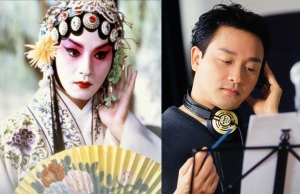
Actor-singers: the late Leslie Cheung, an equally talented actor and singer
B – Blogs
Keeping up-to-date with Chinese pop culture is hard if one can’t read Chinese. It’s even harder when you’re in China and don’t have a VPN to circumvent the censor. A very informative English language blog about C-dramas and occasionally movies and music is cfensi.
Entertainment news can be found here aiyatheydidnt and here fareastvibes.
C – Censorship
A fun fact about Chinese dramas is that they all have to be completely pre-produced. In other countries TV series are often still shooting later episodes while earlier ones in the season are already airing. However, because all content has to pass the censor, production has to be completed before a show airs. For this and scheduling reasons, some TV shows air after they’ve been sitting on a shelf for months or even years. Very recently new guidelines about what may or may not appear on TV have been published. Not so unexpectedly, points like homosexuality (which wasn’t explicitly mentioned before!) or promoting terrorism are banned, but also anything that “blurs the judgement between
China’s-new-television-rules.)
D – Dramas
In the English speaking world and some Asian languages, too, the English word/loanword “drama” is used to describe any fictional serialised TV show from Southeast Asia regardless of the genre. Korean TV shows are “K-dramas”, Chinese ones “C-dramas”, Taiwanese ones “T-dramas” and so on, including all genres such as romantic comedy, crime show or period drama. Unlike many American or British TV shows, dramas usually only have one season with a fixed number of 10 to 54 episodes depending on genre and country.
E – English language pop culture
Although China is trying to protect their domestic market with measures such as a limit on foreign movie releases, pop culture products from the English speaking world are hugely popular. Pretty much any music, film or TV show is available if not officially, then as pirated copies. My students love the BBC’s Sherlock, The Vampire Diaries or Game of Thrones. Pop stars like Adele or Taylor Swift play to stadiums full of people in the major cities. Ironically, the most popular superhero in China seems to be Captain America. By collaborating with domestic partners a company such as Disney is able to get their movies shown in theatres and open the world’s largest Disneyland in Shanghai.)
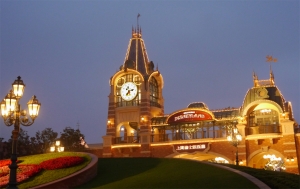
Above: English language pop culture: entrance to Shanghai’s brand new Disneyland
F – Filmmakers and their most notable works (in roughly chronological order)
Fei Mu – Spring in a Small Town
Lu Ban – An Unfinished Comedy
Li Hanxiang – The Winter
Tsui Hark – A Chinese Ghost Story
John Woo – A Better Tomorrow
Chen Kaige – Farewell my Concubine
Tian Zhuangzhuang – The Blue Kite
Jiang Wen – Devils on the Doorstep
Ang Lee – Crouching Tiger, Hidden Dragon
Zhang Yimou – Hero
G – Gaming
Video games are veeeeeery popular in China. China has the largest video game market in the world. Pretty much all my middle/high school students play Minecraft. The recent 2016 Warcraft movie based on the video game series flopped in the US but did extremely well in China. It received the widest Chinese release ever and even opened two days earlier than in the US. That’s all I know about video games. Sorry.
H – Historical dramas
China has a long and rich history which is surely one reason for the ever increasing number of historical dramas. Even if their historical accuracy is often debatable, they are fascinating windows into another time and culture. Some contain fantasy elements, from unrealistically spectacular fighting skills to actual superpowers and mythical creatures. Stories about warrior heroes with martial arts skills in ancient China are called “wuxia” and wuxia dramas have been popular for a long time. My favourite Chinese drama is the epic 54 episode historical drama “Nirvana in Fire” (琅琊榜) which is not based on actual historical events and much prettier to look at than any historical period in reality, I assume. However, it was praised by critics and fans for its historically accurate setting and costumes. It was a huge success in 2015 with billions of views online. Watch a song from its soundtrack sung by actor Wang Kai for a first impression
Wang Kai song on YouTube () and then watch the whole thing on viki.com (-> Streaming). Do it!
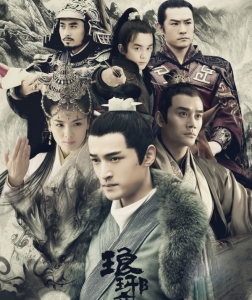
Above: Historical dramas: 2015 hit series Nirvana in Fire
I – Idols
I don’t know where the term “idol” originated in this sense (Japan?), but in South-east Asian countries young pop culture celebrities are called idols. My students often ask me which idol I like. If I said my idol was Marie Curie, they would be so confused. An idol is typically a youngish very good-looking male of female actor, singer, dancer, model, TV personality or any combination thereof, who is discovered, promoted, merchandised and many say “manufactured” by a talent/entertainment agency. If you have a favourite idol, this person is called your “bias”. My High School students’ biases include Taiwanese musician/actor Jay Chou, ex-boy band members Tao and Luhan from China or various Korean idols like Big Bang’s G-Dragon.
J – Japanese pop culture
Despite the strained political relationship between Japan and China, Chinese people are happy to consume Japanese products, from food and electronics to Japanese dramas, manga, anime, movies and pop music. Japanese manga characters such as Hello Kitty, Pokemon, Totoro or Doraemon can be found on everything from school bags, towels, mugs, T-Shirts, shoes, greeting cards to underwear and jewellery. Attempts by the government to limit the number of Japanese films and TV shows shown in China have little effect on their popularity, since almost anything can be watched or bought online or as pirated copies/imitations on the street. Some anime and manga series have been banned as well. Chinese fans are also avid cosplayers and many young people are inspired to learn Japanese to understand their favourite manga and anime. The huge market has been discovered by companies like Alibaba and Tencent who invest heavily in online streaming services and setting up domestic art studios. The goal is to develop Chinese animation that one day might be able to compete with the Japanese products. Japanese anime that are popular in China include One Piece, Sailor Moon, Slam Dunk, Doraemon, Dragon Ball, Naruto, Detective Conan and the films by Studio Ghibli such as Spirited Away or My Neighbour Totoro.
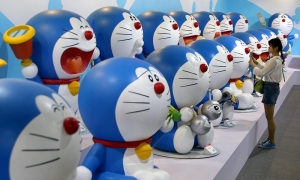
Above: Japanese pop culture: Doraemon exhibition in Qingdao in 2014
K – Korean wave
The Korean wave or “hallyu” describes the ever growing popularity of Korean pop culture products in the past 20 years or so, first through Asia and now globally. K-dramas and K-pop are hugely popular in China, but until recently the lack of enforceable copyright laws has turned off Korean production companies and artists from investing too much in conquering the Chinese market. But now more and more Korean dramas are being co-produced by Korean and Chinese companies and released simultaneously in both countries. Funding from Chinese investments also seems to help relax the censor’s rules about broadcasting foreign dramas. Korean actors popular in China star in Chinese dramas, where their lines are dubbed into Mandarin in post-production. Korean pop artists now release songs in Mandarin and tour Chinese cities. Korean pop culture is so popular in China that the government has become alarmed by the influence this “soft power” might have in China. This year’s mega hit “Descendants of the Sun” was so popular that Chinese authorities warned of the dangers of Korean dramas which “could lead to marital trouble and criminal behaviour” or might make women love sick from falling in love with the male lead. (Source: BBC World News Asia)
At the time of writing political tensions between China and South Korea because of a new missile-defence system in South Korea have led to a proposed ban of Korean actors and dramas and limitations to Korean pop groups’ promotions in China.
L – Largest film studio in the world
Where do Chinese drama and film productions shoot all those incredible scenes in grand ancient palaces, gardens and temples? Surely they don’t close the Forbidden City in Beijing every other day to shoot a TV show. The answer is Hengdian World Studios in Zhejiang Province. In the 1990s a Chinese businessman started building sets near what used to be a small rural town. Now you can find a full-scale replica of the Forbidden City, various palaces from different dynasties, the largest indoor studio in China, replicas of Hong Kong, the Shanghai Bund and much more on eight thousand acres! Globally successful Chinese blockbusters like Hero and Crouching Tiger Hidden Dragon were shot at Hengdian. Ten thousands of people moved to the city to work as extras or in film-related industries and millions of tourists visit the site every year. (More information: New Yorker article about the largest film studio in the world
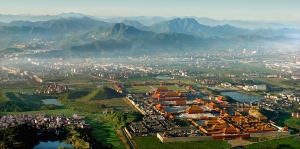
Above: Largest film studio in the world: Forbidden City replica at Hengdian World Studios
M – Movies
Chinese language cinema is something that one could spend a whole lifetime studying. From the beginnings in the early 20th century it was shaped by the political and social struggles and upheavals the country went through. In the 1930s Chinese cinema had its first golden age in Shanghai and produced the first, mostly female, film stars starring in progressive, socially conscious realist pictures. With the Japanese invasion in 1937 most filmmakers fled Shanghai with some moving to Hong Kong where Hong Kong cinema developed into its own distinct industry. After the war a second golden age brought filmmaking back to Shanghai and Beijing. Despite the Communist government-dictated socialist realism and censorship, many films managed to engage in social commentary and take political and aesthetic risks. In Taiwan film production was also strictly regulated by the Nationalist forces. Both governments were particularly harsh on the popular genre of martial arts films (wuxia -> Historical drama). This led to filmmakers and artists moving to Hong Kong which became the centre of martial arts and kung-fu films. The Cultural Revolution brought an end to movie production in Mainland China for almost a decade and almost all previous and foreign films were banned and locked away or even destroyed. After the Cultural Revolution the fourth generation of filmmakers re-emerged who expressed the country’s scarring experiences on film. The industry flourished again and a fifth generation made Chinese cinema popular abroad with experimentation, epic and symbolic images, and complex and critical thinking. After the Tiananmen Square protests some sixth generation filmmakers had to continue their work underground and smuggle their works abroad. The advance of global capitalism towards the end of the 20th century and increased international exposure brought foreign investments to Chinese productions with an eye on the global market and a style more similar to Hollywood. At the same time some filmmakers returned to a more minimalist and introspective style and social criticism. Today there is also a growing number of independent filmmakers who produce low-budget works with digital technology outside of the Chinese film system. China is now well on its way to becoming both the biggest producer and consumer of movies, and more and more Western companies are trying to get a share of the market. The number of foreign films that can be shown each year is still restricted by the government, but the boundaries between domestic and foreign productions are becoming blurred with investments and talent mixing and moving in both directions. (Sources: BFI news)
N – Netizens
In English language media coverage of Chinese (and more generally Southeast Asian) pop culture the term “netizen” appears very frequently. Netizen is a portmanteau of the words “Internet” and “citizen” and describes someone who is active on the internet and involved in online communities. Reporting of celebrity and entertainment news often includes an overview of comments or quotes by netizens on the topic.
O – OST
OST (original soundtrack) is a commonly used acronym for music that was written specifically for a film or drama. Many Chinese films and possibly all Chinese dramas have one or several theme songs. Typically dramas have an opening and an ending theme song that is played during the opening montage and the closing credits respectively. Often the actors are involved in recording or even writing their theme songs, or the help of a pop singer is employed to boost the popularity of the drama. Music videos for the theme songs are released online and of course the OST, including songs and instrumental pieces, can be bought and occasionally even climbs the charts.
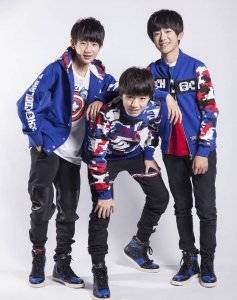
Above: Pop music: China’s most successful pre-teen boy group TFBoys
P – Pop music
Pop music sung in Mandarin is called Mandopop and music sung in Cantonese is called, who would have guessed, Cantopop. I’m really not an expert on Chinese pop music but whenever I ask my Chinese friends or students what Chinese pop music I should be listening to, they think for a long time and then suggest that I shouldn’t. Chinese people can be their own worst critics. Most of the popular Mandopop singers I’m aware of are originally from Taiwan. Absolutely everybody knows Teresa Teng. She started singing in the 1960s and her songs and song coves are classics. Jay Chou is the name I’ve heard most when asking about famous male Chinese pop singers. Singer A-Mei stands out because she is from a Taiwanese aboriginal group and doesn’t belong to the Han Chinese majority. Jolin Tsai is called the “Asian Madonna” and a very successful singer, dancer, songwriter and producer. In the past two years three former members of Korean boy group EXO – Tao, Luhan and Kris – have become successful solo performers in China. Of course home grown boy or girl groups exist, too, (TF Boys, S.H.E., M.I.C.) but very few of them have enjoyed extensive and lasting success.
Q – Queer pop culture
Queer studies in the Chinese speaking world is a relatively new area of study that is getting more and more attention. Just defining the term “queer” could take a whole book. Let’s call it a strategy to disturb heteronormative, binary notions of gender and sexuality. After the Cultural Revolution the state started to see non-heteronormative behaviours as a threat to its moral authority and homosexuality was pathologized and criminalised under the so-called “hooliganism” law until 1997. There have been legal improvements since then but the recent new TV censorship rules ban depictions of homosexuality as “abnormal sexual behaviour” (-> Censorship). However, queerness includes much more than just sexual preference. I just want to introduce one Chinese pop star who challenged traditional binary notions of gender: Li Yuchun. The singer and actress from Sichuan won a national singing competition in 2005 and shot to fame quickly. China had never seen a female celebrity like her. Her deep voice, short hair, androgynous “boyish” look and masculine attire defied the ideal of what a woman should be like in Chinese society. She also starred in several action movies. She opened the door for other androgynous and gender queer artists in the entertainment industry in China. (Watch one of her music videos: Watch one of her YouTube videos).
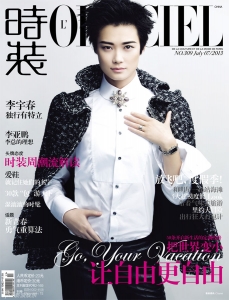
Above: Queer pop culture: singer Li Yuchun defies traditional notions of gender
R – Recommendations
Dramas: Nirvana in Fire (2015, historical gorgeousness), The Disguiser (2015, spies in Shanghai in the 1930s), Love Me If You Dare (2015, psychological crime romance), Bromance (2015, cheesy but fun Taiwanese comedy/romance about a girl pretending to be a boy), Meteor Garden (2002, old Taiwanese high school romance classic, love it or hate it)
Films: Monkey King: Hero’s Return (2015, adorable animated retelling of an ancient Chinese classic), Crouching Tiger Hidden Dragon (2000, international cast and production but set in China and shot in Mandarin, epic wuxia love story with great cast and soundtrack, stay away from the 2016 sequel!!!), The Message (2009, star-studded espionage/crime thriller set in the 1940s), Peacock (2005, life-affirming story of a family after the Cultural Revolution)
S – Streaming
For anyone who has to rely on subtitles to consume Chinese TV shows and movies, online streaming is the way to go. viki.com is a (legal!) video streaming website that offers TV shows and movies from all around the world but with a huge focus on Asia. After the global success of Korean dramas, they are now expanding their Chinese channels. What’s special about Viki is the fact that all subtitles (in dozens of languages!) are produced by volunteers who translate their favourite shows for free because they are avid fans. Another legal streaming website is dramafever.com and Netflix, Hulu and YouTube might have some Chinese dramas, too, but all of these have geo-restrictions. Inside of China there are endless options for streaming TV (youku, tudou, QQ, baidu) but none of them have English subtitles as far as I’m aware.
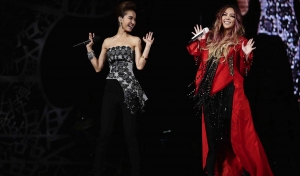
Above: Taiwan: two of Taiwans biggest pop stars, Jolin Tsai and A-Mei
T – Taiwan
Whether Taiwan is considered a part of China or not, it does have its own vibrant pop culture industry. Taiwanese pop stars, actors and entertainers are very active in mainland China and Taiwanese dramas and music constitute a big part of Mandarin language pop culture. Internationally, Taiwanese dramas have amassed a cult following before (Mainland) Chinese dramas started to get more popular outside of China. Several successful K-dramas are remakes of T-dramas and vice versa (e.g. Fated to Love You, You are Beautiful). Taiwanese TV shows and music have long been known to have consistently good production values but Mainland China is catching up quickly now. Occasionally the political tensions between China and Taiwan spill over into the pop culture realm. In November 2015 a Taiwanese teenage pop singer holding a Taiwanese flag on Korean television turned into a huge controversy in China, with internet users accusing the girl of being an independence supporter. Her group was banned from Chinese television and she had to publicly apologise which in turn angered the Taiwanese public. The incident is even said to have affected the 2016 general election in Taiwan.
U – Unicorn
There are no unicorns.
V – Voices
Once you become a regular watcher of Chinese dramas you might notice that your favourite actress suddenly sounds so different in her next drama. That is because most Chinese dramas are dubbed. Usually it has nothing to do with the language as most dramas are shot in Mandarin and dubbed in Mandarin. If they’re lucky, actors even get to dub themselves. The official reason is that the conditions on the sets are too bad and the technology not good enough to make good quality recordings of the actors’ voices on set. It’s more convenient, easier and maybe even cheaper to dub the dialogues in a recording studio. Many actors are known to be unhappy with the practice as they consider voice an important part of their performance and don’t like to be dubbed by other people, but there’s not much they can do about it. Furthermore, by hiring voice actors with standard Mandarin accents, other accents (e.g. of Taiwanese or Cantonese actors) that are considered less attractive are made to disappear this way.
W – Weibo
Weibo (微博) means “microblog” in Chinese and weibo.com (Sina Weibo) is the most popular microblogging website in China. It works like a hybrid of Twitter and Facebook and acts as a replacement for both those sites since they were blocked by the government in 2009. Many Chinese celebrities use their weibo accounts to communicate with their fans and promote their work. Weibo is accessible outside of China but unregistered users can only see verified accounts. Some of the most popular Sina Weibo accounts are managed by pop celebrities, e.g. actress/singer Zhao Wei, TV host/singer/actress Xie Na, TV anchor/singer/all-round talent He Jiong and model/actress Angelababy.
XZY – Your turn!
Are you interested in Chinese pop culture? Have you watched any Chinese films or TV shows? Do you have a favourite “idol”? Have you noticed any differences between Chinese and Western pop culture? Did this rather long article make you curious about Chinese pop culture? Leave a comment below and let me know what you think!
Ready to take the ESL classroom by storm? Here’s more information on our program in China
Interested in considering other options? Though our other brand Impact Teaching, we offer teaching jobs in Vietnam, Thailand, Cambodia or Poland or send in an application.


Leave A Comment
You must be logged in to post a comment.